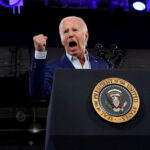Washington, D.C. – Former President Donald Trump’s proposal to impose a 25% tariff on all foreign car imports if re-elected has sent shockwaves through global markets, sparking fierce backlash from key U.S. allies like Canada, Japan, and the European Union. The move, aimed at boosting American auto manufacturing, could trigger a trade war, disrupt supply chains, and escalate economic tensions with nations that rely heavily on U.S. vehicle exports.
With Trump leading in several 2024 election polls, governments and automakers worldwide are bracing for a potential return to aggressive trade protectionism, reminiscent of his 2018-2019 tariff wars. Here’s how this policy could reshape global trade—and why allies are pushing back.
Breaking Down Trump’s Proposed Auto Tariffs
What’s the Plan?
- 25% universal tariff on all foreign-made cars entering the U.S.
- Expansion of “America First” manufacturing policies
- Aim: Force automakers like Toyota, BMW, and Hyundai to shift production to the U.S.
Current vs. Proposed Rates
| Country/Region | Current Tariff | Under Trump’s Plan |
|---|---|---|
| Canada/Mexico (USMCA) | 0% | 25% |
| European Union | 2.5% | 25% |
| Japan | 2.5% | 25% |
| China | 27.5% | Likely higher |
How US Allies Are Reacting
1. Canada: “A Direct Threat to Integrated Supply Chains”
- 40% of Canadian auto exports go to the U.S. (C$50+ billion/year).
- Prime Minister Justin Trudeau: “This would hurt workers on both sides of the border.”
- Industry Response: Canadian automakers warn of plant closures and job losses in Ontario.
2. Japan: “Economic Coercion Will Backfire”
- Toyota, Honda, Nissan shipped 1.7 million vehicles to the U.S. in 2023.
- Govt. Statement: “We will consider WTO litigation if imposed.”
- Industry Fear: Japanese brands may delay EV investments in America.
3. European Union: “Ready to Retaliate with Counter-Tariffs”
- Germany’s BMW, Volkswagen, Mercedes could face $10B+ in new costs.
- EU Trade Chief Valdis Dombrovskis: “We will not accept unilateral penalties.”
- Potential Targets: U.S. whiskey, agriculture, tech exports.
4. South Korea: Hyundai & Kia at Risk
- Alabama/Georgia factories may not offset import losses.
- Seoul’s Warning: Could renegotiate KORUS trade deal.
Economic & Political Fallout
1. Price Hikes for American Consumers
- Study (Peterson Institute): Average car cost may rise 6,000−6,000−8,000.
- EV Adoption Slowdown: Tesla competitors like Volkswagen ID.4 could become unaffordable.
2. Supply Chain Chaos
- Just-in-time manufacturing (used by Toyota, Honda) would face massive disruptions.
- Parts suppliers in Mexico/Canada may collapse, hurting U.S. assembly lines.
3. Global Trade War 2.0?
- 2018-19 Precedent: Trump’s steel tariffs led to EU/China retaliation.
- Biden’s Current Policy: Focus on subsidies (IRA) over tariffs—less confrontational.
Industry Reactions: Automakers Scramble
Foreign Brands’ Contingency Plans
- Toyota: Accelerating Kentucky/Texas production.
- BMW: May cut Spartanburg (SC) exports to offset losses.
- Hyundai: Fast-tracking Georgia EV plant.
US Automakers Divided
- Ford/GM: Could benefit from less competition but fear parts shortages.
- Tesla: Opposes tariffs (relies on Chinese batteries).
Legal & Diplomatic Pathways
1. WTO Challenges Likely
- Past Rulings: Trump’s 2018 auto tariffs were deemed illegal but unenforced.
- EU/Japan/Canada may file new cases.
2. Congressional Pushback?
- Some GOP Senators (e.g., Portman, Toomey) historically opposed auto tariffs.
- Democrats: Likely to frame it as “inflation-boosting” ahead of elections.
Historical Context: Trump’s Tariff Playbook
- 2018 Steel/Aluminum Tariffs: 25% on EU/Canada, led to $3B in retaliatory tariffs.
- China Trade War: $370B in tariffs, failed to revive US manufacturing.
- Key Difference: Auto tariffs would hit allies harder than China.
What Happens Next?
If Trump Wins in November 2024:
- Immediate consultations with trading partners.
- Gradual phase-in to avoid market shock.
- Retaliatory tariffs within 6-12 months.
If Biden Stays in Office:
- Status quo: No new tariffs, focus on domestic EV incentives.
Conclusion: A High-Stakes Gamble
Trump’s proposed 25% auto tariff is more than a trade policy—it’s a geopolitical weapon that could:
✅ Reshore some auto jobs (political win).
❌ Spike inflation, trigger recessions abroad.
❌ Damage decades-old alliances.
With global automakers and governments already sounding alarms, the 2024 election could decide whether the U.S. sparks another economic Cold War—or seeks a more cooperative path.




































